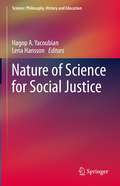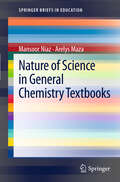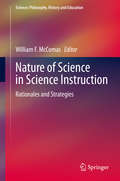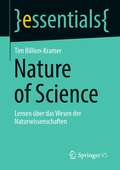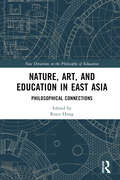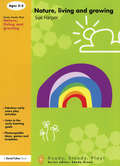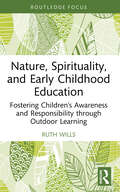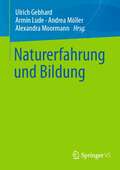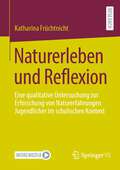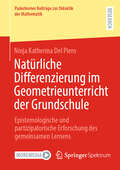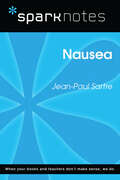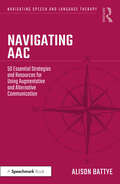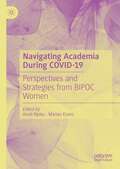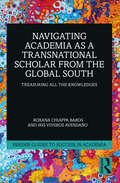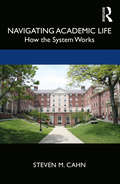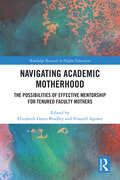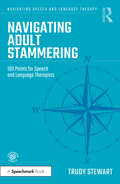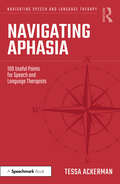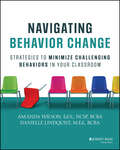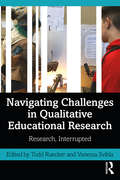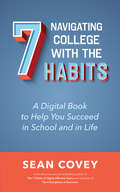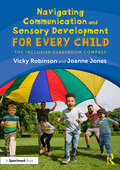- Table View
- List View
Nature of Science for Social Justice (Science: Philosophy, History and Education)
by Hagop A. Yacoubian Lena HanssonThis edited volume brings closer two contemporary science education research areas: Nature of Science (NOS) and Social Justice (SJ). It starts a dialogue on the characteristics of NOS for SJ with the purpose of advancing the existing discussion and creating new avenues for research. Using a variety of approaches and perspectives, the authors of the different chapters engage in a dialogue on the construct of NOS for SJ, its characteristics, as well as ways of addressing it in science classrooms. Issues addressed are related to why a school science aiming at SJ should address NOS; what NOS-related content, skills and attitudes form the basis when aiming at SJ; and how school science can address NOS for SJ. Through a set of theoretical and empirical chapters, the authors suggest answers, but they also pose new questions on what NOS for SJ can mean, and what issues need to be taken into consideration in future research and practice.
Nature of Science in General Chemistry Textbooks
by Arelys Maza Mansoor NiazResearch in science education has recognized the importance of history and philosophy of science (HPS). Nature of science (NOS) is considered to be an essential part of HPS with important implications for teaching science. The role played by textbooks in developing students' informed conceptions of NOS has been a source of considerable interest for science educators. In some parts of the world, textbooks become the curriculum and determine to a great extent what is taught and learned in the classroom. Given this background and interest, this monograph has evaluated NOS in university level general chemistry textbooks published in U.S.A. Most textbooks in this study provided little insight with respect to the nine criteria used for evaluating NOS. Some of the textbooks, however, inevitably refer to HPS and thus provide guidelines for future textbooks. A few of the textbooks go into considerable detail to present the atomic models of Dalton, Thomson, Rutherford, Bohr and wave mechanical to illustrate the tentative nature of scientific theories --- an important NOS aspect. These results lead to the question: Are we teaching science as practiced by scientists? An answer to this question can help us to understand the importance of NOS, by providing students an HPS-based environment, so that they too (just like the scientists) feel the thrill and excitement of discovering new things. This monograph provides students and teachers guidelines for introducing various aspects of NOS, based on historical episodes.
Nature of Science in Science Instruction: Rationales and Strategies (Science: Philosophy, History and Education)
by William F. McComasThis book offers a comprehensive introduction to Nature of Science (NOS), one of the most important aspects of science teaching and learning, and includes tested strategies for teaching aspects of the NOS in a variety of instructional settings. In line with the recommendations in the field to include NOS in all plans for science instruction, the book provides an accessible resource of background information on NOS, rationales for teaching these targeted NOS aspects, and – most importantly – how to teach about the nature of science in specific instructional contexts. The first section examines the why and what of NOS, its nature, and what research says about how to teach NOS in science settings. The second section focuses on extending knowledge about NOS to question of scientific method, theory-laden observation, the role of experiments and observations and distinctions between science, engineering and technology. The dominant theme of the remainder of the book is a focus on teaching aspects of NOS applicable to a wide variety of instructional environments.
Nature of Science: Lernen über das Wesen der Naturwissenschaften (essentials)
by Tim Billion-KramerIn naturwissenschaftlich und technisch geprägten Gesellschaften gilt ein angemessenes Wissenschaftsverständnis als wichtiger Teil von Allgemeinbildung und Scientific Literacy. Es wird in der Naturwissenschaftsdidaktik als Nature of Science (NOS) diskutiert und gelehrt. Dieses essential skizziert Nature of Science-Konzeptualisierungen mit ihren Stärken und Schwächen. Im Focus steht sowohl ein klassischer Minimalkonsens als auch alternative Ansätze. Außerdem werden zentrale Befunde empirischer Forschung und Bedingungen gelingenden Lernens zu Nature of Science dargestellt. Praxisideen sowie Hinweise zur vertiefenden Literatur runden dieses essential ab.
Nature, Art, and Education in East Asia: Philosophical Connections (New Directions in the Philosophy of Education)
by Ruyu HungThis volume explores the deeply interwoven connection of education, art and nature in the context of East Asia. With contributions from authors in South Korea, Japan and Taiwan, the book considers unnoticed but significant themes involved in the interplay of nature, art, and education. It manifests how nature and art can educate, and how education and nature play the role of art. The chapters explore a range of themes relevant to East Asian characteristics, including skill acquisition, Japanese calendar arts and ritual of feelings, garden architecture, the ritualised body, collaborative poetry art, translational language between humans and nature, the Confucian classical Six Arts, the artistic embodiment of the Kyoto School, and the heritage art based education in Korea. The authors examine these themes in novel ways to bring to light the relevance of the East Asian insights to the contemporary global world. This book is an outstanding resource to all researchers, scholars, and students interested in educational aesthetics, philosophy of education, East Asian studies, comparative education and intercultural education.
Nature, Living and Growing: Nature, Living And Growing (Ready, Steady, Play!)
by Harper SueNature, Living and Growing focuses on outdoor play and how nature can contribute to a child’s learning and development. Split into four sections, which focus on each of the four seasons – spring, summer, autumn and winter, this book: includes activities appropriate to each season offers ideas for 'wander walkabouts' to inspire and set the scene of what the season can offer in regard to play activities promotes knowledge of the environment and how to use natural resources effectively.
Nature, Spirituality, and Early Childhood Education: Fostering Children’s Awareness and Responsibility through Outdoor Learning (Routledge Research in Early Childhood Education)
by Ruth WillsThis novel volume delves into a specific and crucial aspect of early years pedagogy – the intersection between early childhood education and spirituality, offering tips on nurturing spirituality and a sense of connectedness with nature through outdoor learning.With experience both as a scholar and a teacher, the author delves into the ontological and epistemological issues related to outdoor learning and education while keeping accessibility and sustainability at the centre of the volume. Chapters take a comprehensive approach to the exploration of children's innate spirituality and their connection with nature in the context of early childhood education, fusing elements such as a critique of early years policy with philosophy of education and children’s mental health. Using a robust theoretical foundation incorporating philosophical figures such as Froebel, McMillan, Montessori, Dewey and Freire, as well as the inclusion of practical examples from educational settings designed for real-world scenarios, this book reinvigorates the conversation around the holistic development of children by emphasising the importance of nature and child-centred pedagogies.Ultimately exploring avenues that can foster a sense of well-being and social responsibility in children, the book will be of interest to researchers, educators and teacher trainers in the field of early childhood education, environmental education, philosophy of education and teacher education. Policy makers and school leaders may also benefit from this volume.
Naturerfahrung und Bildung
by Ulrich Gebhard Armin Lude Andrea Möller Alexandra MoormannNaturerfahrungen haben positive Wirkungen auf die seelische Entwicklung, Gesundheit und Wohlbefinden und können geradezu als ein Element eines „guten Lebens“ interpretiert werden. In diesem Buch wird dieser Zusammenhang auf Lern- und Bildungskontexte bezogen. Bei Bildungsprozessen geht es nicht nur um die Übernahme von relevanten Inhalten, sondern um eine Berührung, Konfrontation und Transformation des Subjekts. Die zentralen Annahmen dieses Buches sind erstens, dass eben dies durch Naturerfahrungen eröffnet werden kann, und zweitens, dass dies auch (fachliche) Lernprozesse positiv beeinflussen kann.
Naturerleben und Reflexion: Eine qualitative Untersuchung zur Erforschung von Naturerfahrungen Jugendlicher im schulischen Kontext
by Katharina FrüchtnichtKatharina Früchtnicht untersucht auf Grundlage von Kleingruppendiskussionen mit Jugendlichen die Bedeutung von Natur und Erlebnissen in der Natur, die Jugendliche diesen beimessen. Zudem wird eine auf Reflexion abzielende Versprachlichung von Erlebnissen in der Natur sowie deren Bedeutung für die Erfahrungsprozesse der Jugendlichen analysiert. Für eine theoretische Klärung des Begriffs ‚Naturerfahrung‘ und der Schärfung eines Reflexionsverständnisses bezieht sich die Arbeit auf den Erfahrungsbegriff von John Dewey sowie auf den didaktischen Ansatz der Alltagsphantasien. Ausgehend von den Ergebnissen der Analyse plädiert die Arbeit für eine pädagogische Praxis, die den Jugendlichen in ihrem Erleben in der Natur ein hohes Maß an Freiheit und Selbstbestimmtheit ermöglicht und gleichzeitig angeleitete Reflexionsanlässe bietet.
Natürliche Differenzierung im Geometrieunterricht der Grundschule: Epistemologische und partizipatorische Erforschung des gemeinsamen Lernens (Paderborner Beiträge zur Didaktik der Mathematik)
by Ninja Katherina Del PieroIn diesem Buch werden auf der Basis von theoretischen und fachdidaktischen Überlegungen zur natürlichen Differenzierung, Interaktion, geometrischen Begriffsbildung und räumlichen Vorstellung zwei geometrische Lernumgebungen vorgestellt, die sich für das gemeinsame Lernen von Schüler*innen mit unterschiedlichen Kompetenzen eignen: „Dreiecke auf dem Geobrett&“ und „Würfelgebäude entdecken&“. Im Rahmen der zehnjährigen Forschungsarbeit, auf der dieses Buch gründet, wurden diese Lernumgebungen konzipiert und in einem Lehr-Lern-Labor der Universität Paderborn mit zahlreichen Grundschulklassen durchgeführt und beforscht. Die Forschungsergebnisse zur epistemologischen sowie partizipatorischen Analyse der Lern- und Interaktionsprozesse zur Lernumgebung „Dreiecke auf dem Geobrett&“ werden in diesem Buch ausführlich präsentiert und hinsichtlich der Konzeption der Lernumgebung und des Gelingens der natürlichen Differenzierung diskutiert.
Nausea (SparkNotes Literature Guide Series)
by SparkNotesNausea (SparkNotes Literature Guide) by Jean-Paul Sartre Making the reading experience fun! Created by Harvard students for students everywhere, SparkNotes is a new breed of study guide: smarter, better, faster. Geared to what today's students need to know, SparkNotes provides: *Chapter-by-chapter analysis *Explanations of key themes, motifs, and symbols *A review quiz and essay topicsLively and accessible, these guides are perfect for late-night studying and writing papers
Nava Vasantham 2 class 7 - Andhra Pradesh Board: నవ వసంతం 2 తరగతి 7 - ఆంధ్రప్రదేశ్ బోర్డు
by ApscertThis is the text book prescribed for Telugu subject for the students of 7th class in Andhra Pradesh.
Navakathanga Ha Viragaya - නවකථාංග හා විරාගය
by Martin Wickramasingha - මාර්ටින් වික්රමසිංහමේ නිබන්ධය නවකථා කලාවෙහි ශාස්ත්රීය හෙවත් දර්ශනාත්මක අංග කිහිපයක් අරබයා කෙරෙන විමර්ශනයකි.
Navalla (6 Kathegala Sangraha): ನಾವಲ್ಲ (೬ ಕಥೆಗಳ ಸಂಗ್ರಹ)
by S N Sethuramಇದು 6 ಸಣ್ಣ ಕಥೆಗಳ ಸಂಗ್ರಹವಾಗಿದೆ. ಈ ಸಂಕಲನದ ೬ ಕಥೆಗಳು ಒಂದಕ್ಕಿಂತ ಒಂದು ಚೆನ್ನಗಿವೆ. ಪ್ರತಿಯೊಂದು ಕಥೆಯಲ್ಲಿನ ಪಾತ್ರಗಳೂ ನಮ್ಮನ್ನು ನಾವೇ ಪ್ರಶ್ನಿಸಿಕೊಳ್ಳೋ ಹಾಗೆ ಮಾಡುತ್ತವೆ. ನಮ್ಮ ಅಂತರಂಗಕ್ಕೆ ಕನ್ನಡಿ ಹಿಡಿದು ನೋಡಿಕೊಂಡ ಹಾಗೆ ಭಾಸವಾಗುತ್ತೆ.
Navigating AAC: 50 Essential Strategies and Resources for Using Augmentative and Alternative Communication (Navigating Speech and Language Therapy)
by Alison BattyeSpeech and Language Therapists are assumed to have a knowledge of AAC (Augmentative and Alternative Communication). The reality is that, unless they have had a student clinical placement in this field, they will qualify with very little experience in this area. This book is an approachable guide to AAC and covers the various types, including paper-based and voice-output communication aids. There is guidance on how to assess a person who might need AAC, and how to work collaboratively with those who support the person on a daily basis. The author discusses the importance of core vocabulary alongside a personalised vocabulary. There are pointers for referring to specialised services, signposting families to alternative sources of funding, and making a business case for buying AAC equipment. Written by an expert in the field, this book provides tips and strategies for SLTs who are brand new to AAC, as well as experienced clinicians wanting to gain further confidence in working with this varied client group.
Navigating Academia During COVID-19: Perspectives and Strategies from BIPOC Women
by Anuli Njoku Marian EvansThis edited volume provides personal narratives of a diverse group of scholars in academia regarding strategies to navigate academia during times of COVID-19 and unrest. Black, Indigenous, and People of Color (BIPOC) women in academia are grappling with emotional tolls and invisible burdens, discrimination, political turmoil, social unrest, and public health crises. Moreover, the rapid pivot response to COVID-19 has exacerbated inequities among BIPOC women in academia. This book explores their stories of ordeal, triumph, loss, and hope.
Navigating Academia as a Transnational Scholar from the Global South: Treasuring All the Knowledges (Insider Guides to Success in Academia)
by Roxana Chiappa Baros Iris Viveros AvendañoThis book centers on the stories of transnational early-career scholars from the Global South who started their postgraduate studies as adult immigrants and international students. This is a fascinating guide to navigating academia for those whose biographies and educational trajectories are not fully recognized by the traditional academia.Inspired by and rooted in Indigenous epistemologies, women of colour feminism, and decolonial studies, the authors—each transnational scholars from the Global South—consider the knowledge systems brought from home that helped them to navigate academia in a foreign country and the knowledges they wished they had before entering postgraduate study. Chapters cover: Overcoming internalized fears and the lack of a sense of belonging. Recognizing the diverse and abundant knowledges that transnational scholars bring to academia. Building healthy relationships with advisors and mentors. Dealing with unexpected events outside of academia while away from home. Seeking jobs during and after the postgraduate degree. Including contributions from leading transnational academics and supported by letters, poems, and drawings, this book serves as a source of information and inspiration for transnational early-career scholars navigating academia.‘Insider Guides to Success in Academia’ offers support and practical advice to doctoral students and early-career researchers. Covering the topics that really matter, but which often get overlooked, this indispensable series provides practical and realistic guidance to address many of the needs and challenges of trying to operate, and remain, in academia.These neat pocket guides fill specific and significant gaps in current literature. Each book offers insider perspectives on the often-implicit rules of the game – the things you need to know but usually aren’t told by institutional postgraduate support, researcher development units, or supervisors – and will address a practical topic that is key to career progression. They are essential reading for doctoral students, early-career researchers, supervisors, mentors, or anyone looking to launch or maintain their career in academia.
Navigating Academic Life: How the System Works
by Steven M. CahnThis engaging collection of recent essays reveals how a professorial career involves not only pursuit of a scholarly discipline but also such unwelcome features as the tribulations of graduate school, the trials of teaching, and the tensions that develop from membership in a department. The author, who enjoyed a distinguished career as a professor of philosophy and senior university administrator, draws on his extensive experience to offer candid advice about handling the frustrations of academic life. Combining philosophical principles, practical concerns, and personal observations, this book serves as a reliable guide for both new and veteran academics as well as for anyone seeking to understand the inner workings of colleges and universities.
Navigating Academic Motherhood: The Possibilities of Effective Mentorship for Tenured Faculty Mothers (Routledge Research in Higher Education)
by Vonzell Agosto Bradley, Edited by Elizabeth GatesThis volume offers a range of scholarly narratives from tenured faculty mothers across North America, sharing insights into their unique struggles, compromises, and successes from their journeys to tenure.Featuring personal essays and research-based commentaries about effective mentoring for mothers in academia, this book unpacks the varied and complex challenges involved in achieving a work/family balance. With contributors from a multitude of types of institutions and disciplines, including psychology, education, music, chemistry, philosophy, and more, this collection of essays presents a diverse and engaging array of perspectives on topics ranging from navigating pregnancy to staying productive while managing competing home and work responsibilities.This important volume is intended for graduate students, professors, higher education administrators, and scholars across education, gender and sexuality in education, and women’s studies. It will also be a vital resource for those with interests in gender equity in education more broadly.
Navigating Adult Stammering: 100 Points for Speech and Language Therapists (Navigating Speech and Language Therapy)
by Trudy StewartThis book, the first in an exciting new series, provides speech and language therapy students and newly qualified and beginning stammering specialists with 100 key points that will help form a strong foundation for their work supporting adults and teenagers who stammer. Composed of practical, relevant and useful advice from an experienced clinician, chapters break advice down into sections which include information about the therapeutic relationship, therapeutic approaches and signposts to further resources. Throughout the book, comments from stammering specialists describe what they wish they had known at the start of their careers. This book: Puts the person who stammers at the heart of therapy, following the clinical choices they might make Is written in an accessible style, designed to be dipped in and out of as required Draws on the experience of therapists working with those who stammer Full of advice and guidance to support effective practice, this is an essential resource for anybody new to this client group.
Navigating Aphasia: 100 Useful Points for Speech and Language Therapists (Navigating Speech and Language Therapy)
by Tessa AckermanNavigating Aphasia provides the reader with a starting point for working with people with aphasia; presenting key, practical points to consider in the clinical management of this client group. With a focus on both the language impairment and the consequences of aphasia, this book is packed with easily accessible, applied advice about assessment and therapy from an experienced aphasia clinician. Key sections include: • Understanding aphasia • Clinical management • Assessment • Approaches to therapy • Language and cognition • Living with aphasia.Concluding with an appendix featuring useful books, websites and professional organisations, this is an essential, practical and comprehensive guide for newly qualified and student speech and language therapists, as well as those new to the world of aphasia.
Navigating Behavior Change: Strategies to Minimize Challenging Behaviors in Your Classroom
by Amanda Wilson Danielle LindquistA master class in preventing challenging student behavior with confidence Navigating Behavior Change is a book for all the teachers and school professionals who struggle with the constant cycle of reacting to student behavior. This guide outlines universal practices which should be in place within every classroom to prevent challenging behaviors before they start. When students are focused and ready to learn, educators can do the important work of teaching. In this book, school psychologist Amanda Wilson and special educator Danielle Lindquist help you build your skill set, so you can create an environment where students are regulated and motivated to learn. Inside, you'll find a comprehensive framework of components that you can implement in any K-12 classroom to prevent challenging behaviors and increase student engagement. Understand the influence of executive functions, missing skills, and motivation on student behavior Learn the core components of classroom management, including class structure and high-leverage instructional practices Effectively and meaningfully embed reinforcement to increase student motivation Learn how to effectively respond to challenging behaviors to assist students in de-escalating and re-engaging Manage your classroom in a trauma-informed way that maintains student dignity This book will help K-12 teachers, special education teachers, school counselors, and other service providers, instructional coaches, and administrators of students with behavior challenges. Take a proactive approach to behavior and help students so you can spend more time teaching and they can spend more time learning.
Navigating Challenges in Qualitative Educational Research: Research, Interrupted
by Todd Ruecker Vanessa SvihlaHow do education researchers navigate the qualitative research process? How do they manage and negotiate myriad decision points at which things can take an unexpected – and sometimes problematic – turn? Whilst these questions are relevant for any research process, the specific issues qualitative researchers face can have impactful repercussions, that if managed adeptly, can lead to successful and even new research opportunities. Navigating Challenges in Qualitative Educational Research includes narratives that provide real world experiences and accounts of how researchers navigated problematic situations, as well as their considerations in doing so. These contributions give students and researchers a chance to understand the possibilities of research challenges and better prepare for these eventualities and how to deal with them. Providing educative windows into the challenges and missteps even seasoned researchers face along the way, this book is an invaluable resource for graduate students and early career qualitative researchers, particularly those who are interested in education.
Navigating College With the 7 Habits: A Digital Book to Help You Succeed in School and in Life
by Sean CoveyAn education expert shares step-by-step advice for improving your college experience by developing academic and life skills.As President of FranklinCovey Education, Sean Covey has long been dedicated to transforming education. In Navigating College With the 7 Habits, he shows college students how to establish habits that lead to a more effective learning experience. This step-by-step book provides readers with the skills, tools, and mindset they need to resolve anything from roommate issues to struggles with difficult classes.Studying and retention skills are incredibly beneficial to student life, but so are essential life skills such as communication and time management. By discovering the value in both academic and life skills, readers can better establish and accomplish a vision for their education and success.Navigating College With the 7 Habits can help you:Get more engaged in class and studiesGain critical skills like money management, goal achievement, conflict resolution, and health and wellnessAdopt essential habits, such as Be Proactive, Think Win-Win, and more
Navigating Communication and Sensory Development for Every Child: The Inclusive Classroom Compass
by Vicky Robinson Joanne JonesDrawing on the authors’ combined expertise in both occupational and speech and language therapy, this essential guide is designed to empower teaching staff in their mission to create inclusive learning environments that support every child.The book offers an accessible exploration of the connection between sensory processing and speech and language difficulties. Illustrated by real-life examples and helpful reflection opportunities, each chapter includes practical strategies and evidence-based interventions to equip the reader with the tools needed to navigate complex challenges with confidence and compassion. With clear guidance on designing inclusive classroom environments, which promote sensory regulation, foster speech and language development, and cultivate collaboration with professionals and families, this book serves as a trusted compass for educators.Navigating Communication and Sensory Development for Every Child provides a roadmap for creating a welcoming and supportive classroom where every child can thrive. It is valuable reading for early years educators, classroom teachers, teaching assistants, SENCOs, and other allied professionals working in both specialist and mainstream settings.
